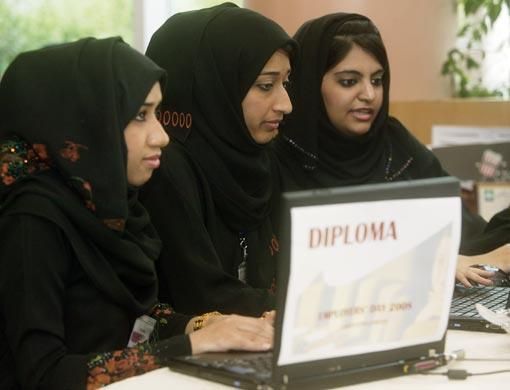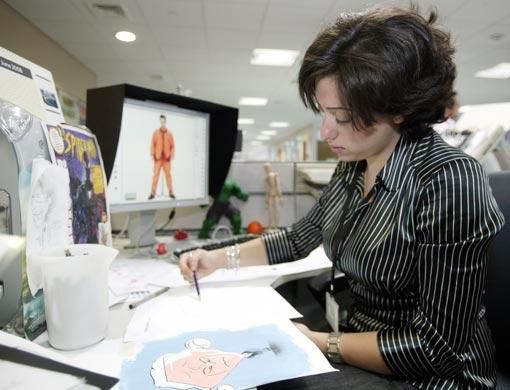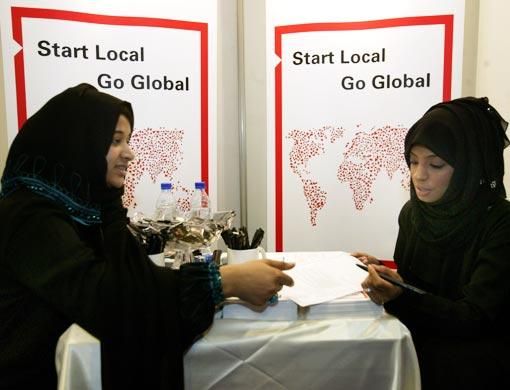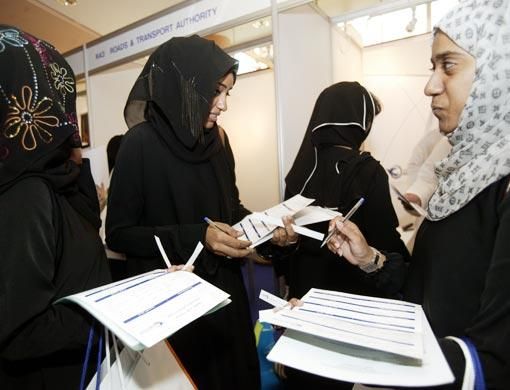Classes have come to an end. Exams and assignments are mercifully over. The temptation to enjoy one's newfound freedom is strong but students still express the desire to earn a little extra cash and gain some work experience.
But what kind of job should students search for? What are the advantages of joining a summer internship programme? What are recruiters looking for? Read on to find out.
Gaining valuable experience
Summer time is the ideal time for students to discover their true career ambitions according to Najla Al Khater, training coordinator at the Dubai International Financial Centre.
Al Khater was speaking at a recent career fair at Dubai Women's College (DWC) attended by more than 50 companies eager to recruit student interns and graduates.
"Since most students don't have anything to do during the summer, this would be the perfect opportunity to gain experience," Al Khater said. "They can explore their options, experiment and see what interests them the most."
Eman Al Mansouri and Afia Al Muhairi are two DWC students who hope to become teachers one day. They plan on using the summer break to explore the field of education.
Eman and Afia both expressed their desire to venture out into the world as they claimed it's a valuable element to developing their careers.
"Staying at home and doing nothing all day doesn't suit me," said Eman. "I want to go out there and work towards something I love and this is the first step towards reaching my goals."
Internships – part of the curriculum
Many universities include internships as a compulsory part of their curricula; students cannot graduate without fulfilling the requirement.
"The internship is designed to give students a greater insight into the business world while offering them professional experience before they graduate," said Mohammad Yassine Otmani, acting Career Advising and Placement Services (CAPS) manager at the American University of Sharjah (AUS).
"Penultimate and final year students are encouraged to undergo this great experience which will provide them a real overview of the work environment, hands-on training in their chosen fields, and an opportunity to practise their knowledge. Also, an internship is seen as a plus in their resumes and would ease their pursuit of full-time employment after graduation."
Students can get real work experience on their own campuses. Universities often offer students on-campus job opportunities that range from working in the library to working in a laboratory.
"Student activities at AUS provide a variety of employment opportunities for students who wish to work on campus during summer," said Otmani. "The positions are funded by the university while the employers are AUS departments, schools, and administrative sections."
Banking and finance
Jobs in this field are probably the most widely available in the UAE. Laila Ayas Bin Hendi, an HR business partner for Barclays bank, gave Notes an insight into what lay ahead for graduates in this sector.
At Barclays internships are granted according to students' degrees and are usually two to three months long.
The company is currently trying to attract UAE nationals to apply as interns.
Interns will most likely have administration duties unless there is a specific project to be completed. "For UAE nationals there are 75 positions available and we're looking for fresh graduates to put them through the training programme," Bin Hendi said. Specialised and technical positions are also available.
As for the working environment at a bank, it is a very mixed culture with almost 50 nationalities at Barclays, Bin Hendi said. "We also have a very open-door policy and the managing director is accessible. It's a very friendly environment where everybody is always happy to help another."
Working hours are between 8am and 5pm, five days a week with Friday and Saturday off. Employees get a one-hour lunch break.
Interns could be paid about Dh2,000 per month. The company also has a graduate training programme for fresh graduates with diplomas or higher diplomas. "It's a three-month course where we send them externally to understand banking, customer service, language and then we train them on the job. All training is paid for as grads are considered full-time employees."
For diploma students the salary is Dh10,000 and for higher diploma or bachelor degree students the starting salary is Dh13,000. For students who are interested in applying, the company is already in touch with university career centres, which supply them with CVs. Find out about jobs via the bank's website www.barclays.ae.
Information Technology
Information Technology skills are also in great demand. Amrita Whabi, a Hewlett-Packard (HP) recruitment analyst in the Middle East, said the company did not have a structured internship programme but currently offered a 12- to 18-month graduate programme.
"Those joining the programme will be eligible for all the benefits every other HP employee is entitled to and they will be trained as graduates," she said.
Graduates can look forward to gaining experience in technical jobs –as customer service engineers, IT business development analysts, technical consultants – and non-technical positions such as sales analysts.
Currently HP has about 70 positions available across the Middle East. Whabi said the company is keen to hire UAE nationals; however, being a free zone company, they do not have fixed quotas.
Whabi described the work environment as extremely flexible with the option to work from home. Working hours are usually from 9am to 6pm.
The company is looking for employees with good qualifications; having prior experience is a bonus. "We want people who are willing to work long hours, and know what we stand for as a brand."
Whabi advises graduates to make sure their CVs are done properly to enhance chances of employment. "Your CV is your passport to get in. Make sure it is well structured and has all the information required." To apply at HP visit www.hp.com/go/jobs
Workplace etiquette
You've secured that internship but the battle is only half won. Understanding your workplace culture, knowing how to deal with clients and being sensitive to people's cultures will make your internship or summer job enjoyable and even secure you a more permanent position.
Nakheel representatives Salem Sulaiman and Maha Al Qattan offered this advice to Dubai Women's College students during the World of Work Conference held at the college recently:
- Be punctual
- Dress appropriately
- Stay away from gossip
- Do not disturb your co-workers unnecessarily
- Work is work – don't turn it into a personal issue
- Report any problems to your line manager, not your friends
- Be courteous to everyone
- Learn the communication style your company prefers for written correspondence and telephone conversations
- Put in extra hours to get things done, without being asked
- Inform your manager if you are sick or running late
Public sector
Buraq Jasem, an HR officer at the Dubai Land Department, said there were several departments with vacancies.
The department has about 25 vacancies ranging from marketing to customer service, IT and HR.
Jasem said they were looking for fresh graduates and also those with some experience.
He advises fresh graduates to never stop studying after taking their higher diplomas or bachelor degrees so that they can continuously develop their skills.
"Experience is very important to recruiters. The moment you have a chance to get a summer job or internship, you should go for it," he said. Graduates may apply for jobs at any of their branches or visit their website at www.dubailand.gov.ae.
Choosing your placement carefully
Some students say that upon signing up with recruiting agencies they are bombarded with emails and text messages every day about various part-time opportunities – mostly promotional.
These jobs are often short - lasting for about three days to a week or so - but are high paying (usually by the hour). Many students fall into the trap of this quick money-making scheme. However, these jobs are often short-lived and do not have career potential.
Among the many advantages of an internship are its long-term benefits. According to Mohammad Yassine Otmani of AUS, the most important element students should look for when seeking a job is not the money, but rather the value added to their knowledge and future career ambitions.
"Prior to searching and applying for internships, students are encouraged to attend internship workshops that make them familiar with the objectives and purposes of the internship," said Otmani.
Graduates' experiences
For Marwa Ali, 21, a third year DWC Information and Business Technology student, securing employment was easy compared to her colleagues' experiences.
"I applied to two places at the career centre and found a summer job at the Al Jazeera Investment Company. I worked with the company for two months and they have already offered me a full-time job," the UAE national said.
Marwa said she thoroughly enjoyed the experience with the company.
"They really appreciated my work; I've learned new things and experienced new skills." The graduate worked at the company's HR department handling administrative duties and assisting with employee contracts.
Her working hours were from 8.30am to 5.30pm and she even worked Saturdays. "My friends would ask me 'why do you work there when the hours are so long?' but I'm not married and I don't mind," said Marwa.
She said the interview for her job was quite informal with the manager asking a few basic questions.
For American national Rami Itani, 23, joining HP's graduate programme was a "hands-on experience".
Working now as a technical consultant and project coordinator for the past four months, the University of Central Florida student loves his work.
"Since joining I've gone through a lot of training where I've been thrown into a project, shadowing my boss and other people," said Itani.
"HP treats its employees very well and the work environment is great. That's one of the reasons I chose this job. With the matrix system they have, you can talk to anybody at any time. Everybody has a cubicle and you can't tell the difference between the vice president and a regular employee."
Itani got into the programme by applying online. "I got a call and did a series of interviews, which was quite hectic. I went through four phone interviews and spoke to my manager twice. They really want to make sure that you want to work for the company, that you're a right fit."
Preparing for an interview
It's time to face an interview and you're head over heels about how you should conduct yourself. Here are some tips that might help you through the process.
Before the interview:
- Research the company through its website
- Know their competitors in the market
- Find out about the job requirements and review your qualifications for the job
- Practise with a friend or your parents
- Prepare answers to questions about yourself
- Drive by the interview venue in order to be familiar with the environment and avoid being late the following day
During the interview:
- Don't be late
- Be well groomed
- Dress appropriately
- Do not chew gum or smoke
- Relax and answer each question concisely
- Respond promptly (leave a good impression)
- Use good manners. Learn the name of your interviewer and shake hands as you meet.
- Use proper English – avoid slang
- Be cooperative and enthusiastic
- Ask questions about the position and the organisation
- Thank the interviewer when you leave
After the interview
- Send a thank you letter and follow up
— Information provided by Mohammad Yassine Otmani, Acting CAPS Manager at the American University of Sharjah
Intern at Gulf News
According to Gulf News personnel officer Nilanjana Javed several internships are available with the company.
- You can intern at the following departments: Editorial, Marketing, Sales and Distribution, Production, Radio, Information Technology, Finance, Human Resources.
- To enquire send an email to recruitment@gulfnews.com
















